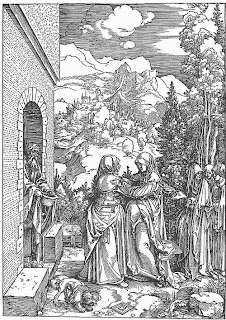 This day commemorates the joyous visit Mary paid to her cousin Elizabeth, following The Annunciation. Inspired by the amazing news that she was to become the mother of the Christ and in response to the joyous word that her old and previously barren cousin was also pregnant, she joined her older cousin during Elizabeth's sixth month of pregnancy (see Luke 1:39-56).
This day commemorates the joyous visit Mary paid to her cousin Elizabeth, following The Annunciation. Inspired by the amazing news that she was to become the mother of the Christ and in response to the joyous word that her old and previously barren cousin was also pregnant, she joined her older cousin during Elizabeth's sixth month of pregnancy (see Luke 1:39-56).After Mary declared the wondrously good news, Elizabeth responded to the Blessed Virgin, "Blessed are you among women, and blessed is the fruit of your womb! ... Behold, when the sound of your greeting came to my ears, the baby in my womb leaped for joy. (vv. 42, 44)" She concluded by giving full credit and glory to God while also commending her young cousin's hearty faith: "Blessed is she who believed that there would be a fulfillment of what was spoken to her from the Lord. (v. 45)"
Mary responded with the Magnificat, the beautiful song of praise beginning, "My soul magnifies the Lord. (vv. 46-55)" It's not clear whether Mary stayed there until after the birth of John or if she left immediately beforehand; Luke merely said that the Virgin "remained with her about three months and returned to her home. (v. 56)"
And so, as we encounter God sending the Forerunner and the Messiah into the world, we see a study in contrasts. Two women stand before each other. One seemingly too old to bear children now carries the final prophet of the Old Covenant. The other, youthful and as yet unwed — completely unprepared in the eyes of the world — carries the One who brings both the Advent and the Fulfillment of the New Testament. And again we see, in the fullness of time, one age passing away while another age begins — an age that has no end but which lasts unto eternity.
The reaction of Jesus' unborn cousin and the words of his mother also serve as reminders to many Christians about the sanctity of life. Christian pro-lifers point to John's celebration as clear evidence of the humanity and the consciousness of children who are still in utero.
Note: This illustration by Albrecht Dürer is from the Web Gallery of Art.
Lection
Psalm 138
Isaiah 11:1-5
Romans 12:9-16
Luke 1:39-56
Collect
Almighty God, You chose the virgin Mary to be the mother of Your Son and made known through her Your regard for the poor and lowly and despised. Grant that we may receive Your Word in humility and faith, and so be made one with Jesus Christ, Your Son, our Lord, who lives and reigns with You and the Holy Spirit, one God, now and forever.
The Magnificat
My soul magnifies the Lord,
and my spirit rejoices in God my Savior,
for he has looked on the humble estate of his servant.
For behold, from now on all generations will call me blessed;
for he who is mighty has done great things for me,
and holy is his name.
And his mercy is for those who fear him
from generation to generation.
He has shown strength with his arm;
he has scattered the proud in the thoughts of their hearts;
he has brought down the mighty from their thrones
and exalted those of humble estate;
he has filled the hungry with good things,
and the rich he has sent empty away.
He has helped his servant Israel,
in remembrance of his mercy,
as he spoke to our fathers,
to Abraham and to his offspring forever.
Technorati Tags: The Visitation | Blessed Virgin Mary | Virgin Mary | Saint Mary | St. Mary | Mary | Theotokos | Mother of God | BVM | Elizabeth | Saint Elizabeth | St. Elizabeth | Magnificat | Luke 1:46-55 | Luke 1:39-56 | Jesus | Christ | Jesus Christ | Church Year | liturgics | liturgical calendar | Christian feasts | lectionary | Church history | Christianity | Christian | Lutheranism | Confessional Lutheran | Dürer | Web Gallery of Art | pro life | life
 Pentecost, an Israelite festival connected to the spring harvest, was the time chosen by the Lord for the special outpouring of the Holy Spirit upon the disciples as they waited in Jerusalem.
Pentecost, an Israelite festival connected to the spring harvest, was the time chosen by the Lord for the special outpouring of the Holy Spirit upon the disciples as they waited in Jerusalem.With wind and fire, the Holy Spirit manifested Himself upon the apostles. Immediately, they rushed out to begin proclaiming the Gospel of Jesus Christ crucified for our sins and raised for our justification. The account is in Acts 2:1-41. Such was the power of the Holy Spirit working through Law and Gospel preaching that He converted over 3000 people faith in Christ at one time.
In Christianity, Pentecost is a "movable feast." Under the Old Covenant, including among modern Jews, Pentecost was (and is) the fiftieth day of Passover. The Christian Church, as more Gentiles swelled its ranks, kept the idea of the fiftieth day but based the celebration on the date for Easter rather than for Passover. See the second question under Notes on the Christian Calendar for a bit more on how we arrive at a date each year.
I've included the appointed readings and the collect for today. All of our Lutheran hymnals and most of those from other bodies include any number of possible hymn choices. Instead of pointing to one of them, I suggest you consider the newly written On the Plain of Shinar, a hymn based on today's Old Testament reading.
Lection: 3-Year Cycle, Series C
Psalm 143
Genesis 11:1-9
Acts 2:1-21
John 14:23-31
Collect
O God, on this day You once taught the hearts of Your faithful people by sending them the light of Your Holy Spirit. Grant us in our day by the same Spirit to have a right understanding in all things and evermore to rejoice in His holy consolation; through Jesus Christ, Your Son, our Lord, who lives and reigns with You and the Holy Spirit, one God, now and forever.
Technorati Tags: The Feast of Pentecost | The Day of Pentecost | Pentecost | Holy Ghost | Holy Spirit | disciples | apostles | tongues of fire | Church Year | pneumatology | liturgics | liturgical calendar | Christian feasts | lectionary | historical theology | vernacular | translation | Jesus | Christ | Law and Gospel | preaching | conversion | Scripture translation | Church history | Christianity| Christian| Lutheranism| Confessional Lutheran
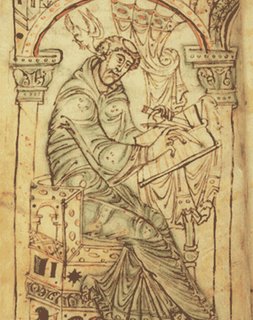 Today marks the heavenly birthday of Bede (pronounced BĒD). Since his commemoration often falls near the end of Eastertide, it's quite likely that many Christians have close familiarity with one of Bede's best known (and one of this Aardvark's favorite) hymns, the Ascension anthem "A Hymn of Glory Let Us Sing."
Today marks the heavenly birthday of Bede (pronounced BĒD). Since his commemoration often falls near the end of Eastertide, it's quite likely that many Christians have close familiarity with one of Bede's best known (and one of this Aardvark's favorite) hymns, the Ascension anthem "A Hymn of Glory Let Us Sing."Bede (673-735) was the last of the early church fathers and the first to compile the history of the English church. Born in Northumbria, Bede was given by his parents to a monastery in Northern England at the age of seven. He was ordained when he was thirty.
Probably the most learned man of his time, he was a prolific writer of history and his careful use of sources provided a model for historians in the Middle Ages. His skill in both history and theology gave him the ability to complete a synthesis between the older Celtic monasticism and the later Rule of Saint Benedict.
Known best for his book Historia ecclesiastica gentis Anglorum (The Ecclesiastical History of the English People), he was also a profound interpreter of Scripture; his edition of the Vulgate was the standard in Catholicism until 1979 and his commentaries still provide fresh insights for today's readers.
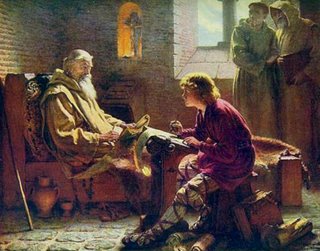 His most famous disciple, Cuthbert, reported that Bede was working on a translation of John's Gospel into English when death came. He also said that Bede died with the words of the Gloria Patri on his lips.
His most famous disciple, Cuthbert, reported that Bede was working on a translation of John's Gospel into English when death came. He also said that Bede died with the words of the Gloria Patri on his lips.Bede also popularized the use of Anno Domini Nostri Iesu Christi ("in the Year of Our Lord Jesus Christ") in speaking of the time since our Savior's birth. This is usually shortened to Anno Domini or AD.
Attested hymns include Hymnum canentes martyrum ("The Hymn for Conquering Martyrs Raise"), Hymnum canamus Domino (translated variously as "A Hymn of Glory Let Us Sing," "The Hymn of Glory Sing We," and "Sing We Triumphant Hymns of Praise"), and Praecursor altus luminis ("The Great Forerunner of the Morn"). He also wrote vernacular poetry.
Bede received the title "Venerable" within two generations of his death and is buried in Durham Cathedral as one of England's greatest saints.
Lection — ESV Except as Noted
Psalm 78:1-4 or 19:7-14
Wisdom 7:15-22 (NRSV)
Matthew 13:47-52
Collect
Heavenly Father, who called your servant Bede, while still a child, to devote his life to Your service in the disciplines of religion and scholarship, grant that as he labored in the Spirit to bring the riches of Your truth to his generation, so we, in our various vocations, may strive to make You known in all the world; through Jesus Christ our Lord, who lives and reigns with you and the Holy Spirit, one God, now and forever.
A Hymn of Glory Let Us Sing
A hymn of glory let us sing New songs throughout the world shall ring
Alleluia, Alleluia.
Christ, by a road before untrod Ascendeth to the throne of God.
Alleluia, Alleluia, Alleluia, Alleluia, Alleluia.
The holy apostolic band Upon the Mount of Olives stand
Alleluia, Alleluia.
And with His followers they see Jesus' resplendent majesty
Alleluia, Alleluia, Alleluia, Alleluia, Alleluia.
To Whom the angels drawing nigh, "Why stand and gaze upon the sky?"
Alleluia, Alleluia.
"This is the Savior," thus they say. "This is His noble triumph day."
Alleluia, Alleluia, Alleluia, Alleluia, Alleluia.
"Again ye shall behold Him so, As ye have today seen Him go."
Alleluia, Alleluia.
"In glorious pomp ascending high Up to the portals of the sky."
Alleluia, Alleluia, Alleluia, Alleluia, Alleluia.
O grant us thitherward to tend And with unwearied hearts ascend,
Alleluia, Alleluia.
Unto Thy kingdom's throne, where Thou As is our faith, art seated now,
Alleluia, Alleluia, Alleluia, Alleluia, Alleluia.
Be Thou our Joy and strong Defense, Who art our future Recompense,
Alleluia, Alleluia.
So shall the light that springs from Thee Be ours through all eternity,
Alleluia, Alleluia, Alleluia, Alleluia, Alleluia.
O risen Christ, ascended Lord, All praise to Thee let earth accord,
Alleluia, Alleluia.
Who art, while endless ages run, With Father and with Spirit One,
Alleluia, Alleluia, Alleluia, Alleluia, Alleluia.
More on Bede's hymns and related information from Cyberhymnal.
Technorati Tags: The Venerable Bede | Bede | Saint Bede | St. Bede | The Ecclesiastical History of the English People | Historia ecclesiastica gentis Anglorum | Northumbria | Anno Domini Nostri Iesu Christi | Anno Domini | A.D. | hymnody | historiography | history | Church Year | liturgical calendar | Christianity | Christian feasts | biography | hagiography | commemorations | lectionary | historical theology | practical theology | exegetical theology | exegetics | vernacular | translation | Bible translation | Scripture translation | liturgics | Church history | European history | English history | British history | Middle Ages | monasticism
 Esther is the heroine of the biblical book that bears her name. Her Jewish name was Hadassah, which means "myrtle." Her beauty, charm, and courage served her well as queen to King Ahasuerus. In that role she was able to save her people from the mass extermination that Haman, the king's chief adviser, had planned (2:19-4:17).
Esther is the heroine of the biblical book that bears her name. Her Jewish name was Hadassah, which means "myrtle." Her beauty, charm, and courage served her well as queen to King Ahasuerus. In that role she was able to save her people from the mass extermination that Haman, the king's chief adviser, had planned (2:19-4:17).Esther's efforts to uncover the plot resulted in the hanging of Haman on the very same gallows that he had built for Mordecai, her uncle and guardian. Then the king named Mordecai minister of state in Haman's place. This story is an example of how God intervenes on behalf of his people to deliver them from evil, as here through Esther he preserved the Old Testament people through whom the Messiah would come.
Even though the book nowhere bears the name of the Lord (Yahweh), it is included in the canon of Scripture because it shows His providential protection of His people as He preserved the line of the Messiah.
Technorati Tags: Esther | Hadassah | Ahasuerus | King Ahasuerus | Lord | Yahweh | God | Haman | Mordecai | providence | Bible | Old Testament | Bible history | Church Year | liturgical calendar | Christianity | Christian | Lutheran | Lutheranism | Christian feasts | biography | hagiography | commemorations | lectionary | exegetical theology
Please head over to the main blog to see what Random Dan put together from various contributors for Lutheran Carnival L.
The next scheduled host is the Moose Report. After that, Dan, Elle, and Dan are seeking more hosts.
Technorati Tags: Lutheran Carnival | blog carnival | Lutheran | confessional Lutheran | Moose Report
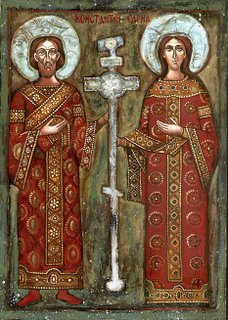 Flavius Valerius Aurelius Constantinus served as Roman Emperor from AD 306 to 337. During his reign the persecution of Christians was forbidden by the Edict of Milan in 313, and ultimately the faith gained full imperial support.
Flavius Valerius Aurelius Constantinus served as Roman Emperor from AD 306 to 337. During his reign the persecution of Christians was forbidden by the Edict of Milan in 313, and ultimately the faith gained full imperial support.Constantine took an active interest in the life and teachings of the church and. He called the First Council of Nicaea in 325 at which Saint Athanasius and others defended and defined orthodox Christianity. Among the fruits of this council was one of Christendom's major confessions of faith, the Nicene Creed.
Some argue that Constantine may not have been true believer since he wasn't baptized until his death bed. However, he actively supported Christianity in his later life and even preached upon occasion. Other scholars speculate that he delayed baptism for the same reason as did many others during portions of the Church's history, that of a general misunderstanding of Holy Baptism.
 Many theologians spoke of the need for "satisfaction" — making amends for sins committed during one's life — and warned about time that would be spent in Purgatory by those who didn't make full satisfaction while still living. Indeed, some even taught that unless proper penance was done, one might find himself forever barred from Heaven!
Many theologians spoke of the need for "satisfaction" — making amends for sins committed during one's life — and warned about time that would be spent in Purgatory by those who didn't make full satisfaction while still living. Indeed, some even taught that unless proper penance was done, one might find himself forever barred from Heaven!Since Baptism truly washes away all sin — both that of our birth nature and any transgressions committed later — some thought the best way to avoid Purgatory (or Hell) was to be baptized when one was at death's door. In so doing, people believed that there would be no unrepented, unsatisfied sins remaining that would leave one waiting for eternal bliss or forever denied its blessings.
I'll not argue here the reasons why Lutherans reject the notion of satisfaction or the idea of Purgatory. I'll merely say that if Constantine had such worries, he wasn't alone during his day, and his decision to delay would be understandable in light of such teaching.
Saint Helena, ca. AD 255-329
Constantine's mother Helena strongly influenced her son throughout his life. Her great interest in locating the holy sites of the Christian faith led her to become one of the first Christian pilgrims to the Holy Land. Her research led to the identification of Biblical locations in Jerusalem, Bethlehem, and beyond, which are still maintained as places of worship today. One of Christianity's annual festivals, Holy Cross Day, has its origin in her explorations of Palestine.
Collects
O Lord, our God, King of the universe, who raises up earthly rulers to work Your will in this life, You called Constantine to the imperial throne and ended wide-spread persecution of Your Son's Church; grant that as he served You by fulfilling his vocation, so we would continue to receive from You rulers who allow the Church to proclaim the saving Gospel of Your Son, Jesus Christ, our Lord, who lives and reigns with You and the Holy Spirit, one God, now and forever.
Almighty God, who called your servant Helena to an earthly position of authority so that she might advance your heavenly kingdom, filling her with zeal for your Church and love for Your people, grant that we may be fruitful in good works and steadfast in our faith in Your Son, and finally by your mercy attain everlasting life; through Jesus Christ our Lord, who lives and reigns with you and the Holy Spirit, one God, now and forever.
Technorati Tags: Constantine the Great | Flavius Valerius Aurelius Constantinus | Constantine | Saint Constantine | Constantine I | Helena | Saint Helena | Holy Cross Day | Council of Nicaea | First Ecumenical Council | Nicene Creed | Niceno-Constantinopolitan Creed | Athanasius | Nicaea | Church Year | liturgical calendar | Christianity | Christian | Lutheran | Lutheranism | Christian feasts | biography | hagiography | commemorations | lectionary | historical theology | Church history | European history
 With eleven known changes, it was time to once again update the Big Blogroll O' Vark®™©. Now we'll see who says, "Oh, duh, I shoulda told the Aardvark about...." After all, almost every update brings one or more responses concerning adding, deleting, or changing a listing.
With eleven known changes, it was time to once again update the Big Blogroll O' Vark®™©. Now we'll see who says, "Oh, duh, I shoulda told the Aardvark about...." After all, almost every update brings one or more responses concerning adding, deleting, or changing a listing.Now if you're not sure what to make of the BBOV or wonder about the benefits of being listed and of listing others' blogs, please read the first three links under Aurous Effluence in the sidebar. Those who'd like the Big Blogroll O' Vark®™© can either email me or copy the list from the Alley's source code (click View | Page Source or Control+U in Firefox or View | Source in Internet Explorer).
• HOWDY
Before saying, "Sayonara," to our two departing blogs, let's join in welcoming the 9 (count 'em, nine) newbies.
I notice in reading others' blogs that my idea of alphabetical order isn't held unanimously. If a blog starts with a definite or indefinite article, I skip to the next word. Therefore, "The Albino Peacock," one of today's additions, is listed as an "A" blog, not a "T". So by my reckoning, these are all in alphabetical order. I've been a bit less consistent with the article in other languages (notably Latin and German). If you think that I should make any corrections, let me know.
Without (much) comment, here are our newest playmates.
¤ The Albino Peacock asks, "Ever feel like the Odd Woman Out?"
¤ The Augsblog Confession — Looks confessional to me
¤ The Crafty Wright's — Family, faith, and unschooling
¤ Helmets Required II — Can you say Favre?
¤ Laughing Martin — From Pr. I. M. Abaldy II
¤ Lutheran Hen — The vocation of Christian wife and mother
¤ Tell the Good News About Jesus — excellence from Wyoming District Evangelism
¤ Treaties on Clockwork Silence — Youth will be served
¤ Trouble in Paradise comes from the self-proclaimed ELS Bad Boy
• ADIOS
Of the two we've lost, Backward Kingdom just disappeared while Pastor Cholak told me that he was too busy with his new position to keep The Crowned Ones going.
• FINALLY
For these and all others enrolled in the BBOV, links back are certainly appreciated. And don't forget that all of those listed benefit when you use the entire blogroll. Also, if you'd like to graphically point to the Alley and the Big Blogroll O' Vark®™©, you may use the above design from St. Charles Place or one of these blog buttons:
Finally, if you own or know of a Lutheran blog demonstrating a quia confessional subscription and would like me to consider it for inclusion, please leave a comment. And again, for more information about why this stuff benefits confessional Lutheran blogging, morality, and other worthwhile endeavors, please check out the first three links under Aurous Effluence in the sidebar.
Technorati Tags: Aardvark Alley | Big Blogroll O' Vark®™© | BBOV | blogroll | blog roll | Lutheran | confessional Lutheran
The second Sunday of May is Mother's Day here in these United States. From its origins in 19th Century feminism and pacifism, the day grew into a general celebration of motherhood — and a bonanza for greeting card companies, florists, and gift sellers looking to make a few bucks on others' holiday zeal (or guilt). I won't belabor any of these points, although if you and your mom are somehow estranged, you have no day like today to start getting in touch with her.
No, the "Mom" in the apologetic title is another mother — the Mother of all Believers. And every Sunday is chock-full of kids who should be sorry about their neglect of her the day, the week, the month, or the year(s) before. Yeah, that Mother ... Holy Mother Church, the Bride of Christ, the woman of Revelation 12 whose offspring are borne in her womb and birthed in her font.
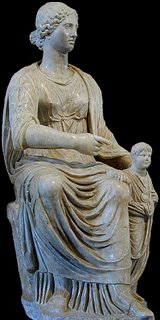 Mom doesn't want the kids just to visit on Christmas, Easter, and maybe Mother's Day. She'd like to have every one of us around all the time. All the good our Father brings home — reconciliation, protection, guidance, and direction — she readily shares with her family. She sets the table with the wonderful meal provided by her Firstborn Son and invites the rest of us to eat and drink. She misses the kids when they're too busy with other stuff to even drop by for a couple hours each week.
Mom doesn't want the kids just to visit on Christmas, Easter, and maybe Mother's Day. She'd like to have every one of us around all the time. All the good our Father brings home — reconciliation, protection, guidance, and direction — she readily shares with her family. She sets the table with the wonderful meal provided by her Firstborn Son and invites the rest of us to eat and drink. She misses the kids when they're too busy with other stuff to even drop by for a couple hours each week.Like any good parent, Mother wants us to grow up. Unlike most parents, she doesn't want us to move out. Instead, she wants us to bring up our own families within the family the she's been raising with our Father. Another mouth to feed? No problem! Huge loads of soiled linens? Bring 'em on! Like Father, like Mother: She insists you behave yourself, yet she's always ready to forgive you when you don't.
So, how are you and Mom getting along? Even if it's been a while, she's always glad to see you. Just don't try to fool yourself into thinking that as long as you and Father are on good terms, you can forget about her. You see, they go together. Disrespect and neglect of Mother is disrespect and neglect of Father.
Our Mother's place is our Father's house, and He warns us not to be "neglecting to meet together, as is the habit of some" but rather to cherish and seek out every opportunity to join the rest of the family in encouraging "one another to love and good works. (Hebrews 10:24-25)" Unlike our American secular holiday, the Lord's Day comes around every week — and each new Lord's Day also brings a fresh Mother's Day. With it comes a fresh opportunity to join with our Mother — and all our brothers and sisters — to celebrate our family, to have our dirty clothes replaced with the clean robes of righteousness, to have our spiritual hunger nourished and our need for communion and community met.
One last thing to consider — I remember asking my dad, "If you get Father's Day and Mom gets Mother's Day, why isn't there a Kids' Day?" Echoing who knows how many parents before him, Dad said, "Every day is Children's Day." For the Christian, this is especially true. Every day we live in our Father's grace is a blessed day for us. All our days are extra special when we spend them with our Heavenly Father, our Holy Mother, and all the rest of the family.
So this Mother's Day — and every Sunday — don't forget Mother. Bring a gift if you want; it's not required and she's happy if you just bring yourself. Come back home and rediscover how much she and Father love you.
Someone who regularly writes love letters to and about our Mother is Deaconess Carder of Quicunque Vult. She readily teaches and regularly reminds us that all Christians — men and women, boys and girls — are "Momma's Boys."
She just posted Celebrating Mothers. Along with it, you might also check out 2005's False Momma's Boys.
Technorati Tags: Mother's Day | Holy Mother Church | Holy Christian Church | Christian Church | Church | outside the Church there is no salvation | Extra Ecclesiam nulla salus | worship | family | home | God | Father | Mother | Mom | Lord's Day | Sunday | Gottesdienst | Divine Service | Deaconess Carder | Emily Carder
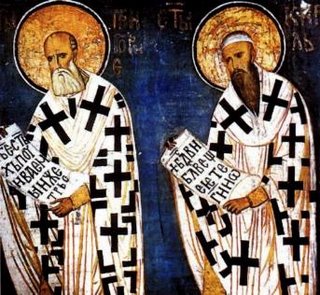 Saint Cyril and Saint Methodius were missionaries to the Slavs. The brothers Constantine and Methodius came from a Greek family in Thessalonica. Younger brother Constantine took the name Cyril when he became a monk in 868. After ordination, Cyril became librarian at the Church of Holy Wisdom (Hagia Sophia) in Constantinople.
Saint Cyril and Saint Methodius were missionaries to the Slavs. The brothers Constantine and Methodius came from a Greek family in Thessalonica. Younger brother Constantine took the name Cyril when he became a monk in 868. After ordination, Cyril became librarian at the Church of Holy Wisdom (Hagia Sophia) in Constantinople.In 862, Emperor Michael III and the Patriarch Photius sent the brothers as to what is now the Czech republic, where they taught in the native Slavic tongue. While the fact of their sending may have included the emperor's political designs, the brothers seem to have focused only upon the spiritual aspect of their task.
Cyril is said to have invented the alphabet today know today as Cyrillic, which provided a written language for the liturgy and Scriptures for the Slavic peoples. Slavic alphabets include characters from Greek with extra symbols devised for sounds not expressed in Greek.
Their use of the vernacular established an important principle for evangelical missions. People could be taught directly without needing to first instruct them in the language of the Bible before teaching them what it said about their salvation.
Note: Cyril is traditionally celebrated in many places on 14 February, his date of death, and Methodius is often combined with him. I'm following the lectionary from the new Lutheran Service Book, which moved the brothers' commemoration to 11 May, evidently because so much of the Western Church associates 14 February with Saint Valentine.
Collect
Almighty and everlasting God, who by the power of the Holy Spirit moved your servant Cyril and his brother Methodius to bring the light of the Gospel to a hostile and divided people, overcome all bitterness and strife among us by the love of Christ, and make us one united family under the banner of the Prince of Peace; who lives and reigns with You and the Holy Spirit, one God, now and forever.
Technorati Tags: Saint Cyril | Saints Cyril and Methodius | Saint Methodius | Cyril | Constantine | Methodius | Cyril and Methodius | Cyrillic | Slavic | missionaries | missions | vernacular | translation | Bible translation | Scripture translation | liturgy | Church Year | liturgical calendar | Christianity | Christian | Lutheran | Lutheranism | Christian feasts | biography | hagiography | commemorations | lectionary | historical theology | exegetical theology | Church history | European history
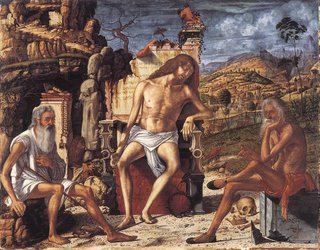 Job was a blameless and upright man who came from Uz (Job 1:1), a land northeast of Canaan. The Book of Job examines the depths of his faith, which was severely tested through the sufferings God permitted.
Job was a blameless and upright man who came from Uz (Job 1:1), a land northeast of Canaan. The Book of Job examines the depths of his faith, which was severely tested through the sufferings God permitted.Despite the sudden death of his ten children and the loss of all his wealth and his health, Job refused to curse God: "Naked I came from my mother's womb, and naked shall I return; the Lord gave, and the Lord has taken away; blessed be the name of the Lord. (1:21)"
In the midst of his tribulations, Job questioned the meaning and purpose of suffering to the point of asserting his own righteousness (34:5-6). Finally, the Lord revealed that a man cannot know the mysteries of God (chapters 38-41). Still, Job's faith in his Redeemer and the resurrection prevailed even in the midst of horrible testing and he made a beautiful confession of faith (19:25-27). In the end, the Lord restored his wealth and blessed him with another seven sons and three daughters.
For a present-day examination of the same issues faced by our brother Job, please see how Ask the Pastor addressed the question Why Suffering and Death?
Lection
Psalm 18:1-6
Job 19:23-27
2 Corinthians 11:16-33
Matthew 27:33-50
Collect
O Lord, our Rock and our Salvation, the rejected Stone who became Cornerstone, as the hope of seeing Your Day sustained Job in his trials and gave voice to his confession, we pray that You would engrave Yourself in our hearts and minds and sustain all who trust in You. Let not our troubles in this life cast us down from our secure position in You but keep us steadfast in faith unto life everlasting; for You live and reign with Your Father and the Holy Spirit, one God, now and forever.
Notes on the Art
The Meditation on the Passion, c. 1510, by Vittore Carpaccio, depicts Job (right) and Saint Jerome meditating upon the body of the dead Christ. The marble block upon which Job sits bears the inscription, "I know that my Redeemer lives" and the chair holding the Savior's body includes other Old Testament references to Him. Many details underscore the themes of death and resurrection. Note how the bones next to Job, the crown of thorns propped up against Christ's broken throne, the desolate scenery and wild animals on the left all show death and decay. Meanwhile, the small bird flying upward from Jesus, the engraved words, and the lush landscape to the right give witness to the resurrection and new life in Christ. Painting digtized by the Web Gallery of Art.
Technorati Tags: Job | suffering | affliction | Lord | God | grace | Uz | patriarch | Bible | Old Testament | Bible history | Church Year | liturgical calendar | Christianity | Christian | Lutheran | Lutheranism | Christian feasts | biography | hagiography | historical theology | exegetical theology | Church history | resurrection | I know that my redeemer lives | Gospel
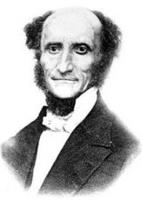 Carl Ferdinand Wilhelm Walther was a founding father of The Lutheran Church — Missouri Synod. He served as its first president from 1847 to 1850 and again from 1864 to 1878. Others who worked with him in the Synod's early days included Friedrich Wyneken and Wilhelm Sihler.
Carl Ferdinand Wilhelm Walther was a founding father of The Lutheran Church — Missouri Synod. He served as its first president from 1847 to 1850 and again from 1864 to 1878. Others who worked with him in the Synod's early days included Friedrich Wyneken and Wilhelm Sihler.The son of a pastor, he was born in Langenchursdorf, Saxony on 25 October 1811. Walther's studies at the University of Leipzig and the influences of older Lutherans helped convince him that Lutheran teachings were correct expositions of Holy Scripture. However, some of his mentors were staunch Pietists, relying heavily on experience and emotion as part of conversion and sanctification. Walther rejected Pietism but seemed to always struggle against its encroachment in his theology.
Fearing a "union church" with the Reformed — as had been happening in Prussia — Walther joined with several other younger pastors under the leadership of Martin Stephan, who encouraged emigration to the United States in order to maintain confessional purity by avoiding imposed unionism. In 1839 he left Germany with other Lutherans. After a series of trials, the party settled along the Mississippi River south of Saint Louis, Missouri. Circumstances still clouded in a certain degree of ambiguity led the Saxons to depose Stephan as their leader and they finally settled upon Walther as his replacement.
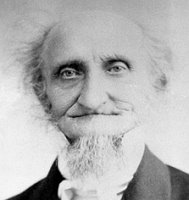 He served as pastor of several congregations in St. Louis, founded Concordia Seminary, and in 1847 was instrumental in the formation of the LCMS (then called the Deutsche Evangelisch-Lutherische Synode von Missouri, Ohio und anderen Staaten — the German Evangelical Lutheran Synod of Missouri, Ohio, and Other States). Walther worked tirelessly to promote confessional Lutheran teaching and doctrinal agreement among all Lutherans in the United States.
He served as pastor of several congregations in St. Louis, founded Concordia Seminary, and in 1847 was instrumental in the formation of the LCMS (then called the Deutsche Evangelisch-Lutherische Synode von Missouri, Ohio und anderen Staaten — the German Evangelical Lutheran Synod of Missouri, Ohio, and Other States). Walther worked tirelessly to promote confessional Lutheran teaching and doctrinal agreement among all Lutherans in the United States.Walther was a prolific writer and speaker. Among his most influential works are Church and Office (aka Church and Ministry) and The Proper Distinction between Law and Gospel. He also published Der Lutheraner, the LCMS's official news magazine for most of the time the Synod spoke and understood German.
Walther was one of many who stood steadfast in confession of the Evangelical, Orthodox, Catholic, and Apostolic Faith. For a sampling of some of the others in Lutheranism, please see The Meanies of Grace.
Lection
Psalm 46
Isaiah 55:6-11
Romans 10:5-17
John 15:1-11
Collect
O Lord God, heavenly Father, we pray that, as You raised up C. F. W. Walther to lead the Lutherans in American into a renewed appreciation of their confessional heritage and trust in the saving Gospel of Jesus Christ, so You would continue to provide them with faithful pastors and leaders, keep them steadfast in Your grace and truth, defend them against all enemies of Your Word, and bestow on Christ's Church Militant Your saving peace; through Jesus Christ, Your Son, our Lord, who lives and reigns with You and the Holy Spirit, one God, now and forever.
Technorati Tags: C.F.W. Walther | Carl Ferdinand Wilhelm Walther | Friedrich Wyneken | Wilhelm Sihler | Church Year | liturgical calendar | Christian | Lutheran | Lutheranism | confessional Lutheran | confessional Lutheranism | orthodox Lutheran | orthodox Lutheranism | commemorations | lectionary | historical theology | church history | Lutheran history | American Lutheran history | American history | biography | The Lutheran Church — Missouri Synod | LCMS | Concordia Seminary | Concordia Seminary, Saint Louis, Missouri | Law and Gospel | The Proper Distinction between Law and Gospel | Church and Office | Church and Ministry | Der Lutheraner | Aardvark Alley
It's not ill, nor is it Illinois. Rather, it's Dan and Elle's randomly intolerant presentation of the forty-ninth installment of the Lutheran Carnival of Blogs.
Technorati Tags: Lutheran Carnival | blog carnival | Lutheran | confessional Lutheran | Random Intolerance
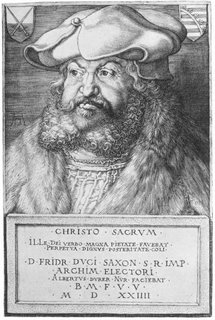 Frederick the Wise, elector of Saxony from 1486 to 1525, was Martin Luther's sovereign in the early years of the Reformation. Indeed, were it not for Frederick, there might not have been a Lutheran Reformation. Born in Torgau in 1463, he became so well known for his skill in political diplomacy and his sense of justice and fairness that he was called "the Wise" by his subjects.
Frederick the Wise, elector of Saxony from 1486 to 1525, was Martin Luther's sovereign in the early years of the Reformation. Indeed, were it not for Frederick, there might not have been a Lutheran Reformation. Born in Torgau in 1463, he became so well known for his skill in political diplomacy and his sense of justice and fairness that he was called "the Wise" by his subjects.Though he probably never met Luther face-to-face, Frederick repeatedly protected and provided for him. In all likelihood he saved the reformer from a martyr's fate. Even in earlier days, Frederick unknowingly contributed to the Reformation, for in 1512, Vicar-General Johann von Staupitz of the Augustinian Order came to the Elector, asking him to subsidize the expenses of the promising but poor scholar-monk as a means of strengthening Frederick's prized university in Wittenberg.
While he never made public renunciation of Roman Catholicism, Frederick refused the pope's demand to extradite Luther to Rome for a heresy trial in 1518. When Emperor Charles V declared Luther an outlaw in 1521 at the Diet of Worms, Frederick provided sanctuary for Luther at the Wartburg castle.
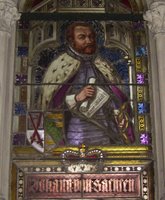 Finally, at the end of his life, the elector gave the clearest indication of his beliefs and sympathies. On his deathbed, Frederick received the Lord's Supper in both kinds — a clear confession of the Evangelical faith.
Finally, at the end of his life, the elector gave the clearest indication of his beliefs and sympathies. On his deathbed, Frederick received the Lord's Supper in both kinds — a clear confession of the Evangelical faith.Frederick received great encouragement in his support of Luther and the Evangelical Reformation from his brother John, who wholeheartedly embraced the Reformation in its early years. Upon Frederick's death, Duke John became Elector of Saxony. John's nickname was "the Steadfast" — indicating how he continued his brother's protection and encouragement of the Reformation.
Frederick's life illustrates many of the rapid changes sweeping across Europe during the Renaissance and Reformation. He went from being a collector and venerator of relics — and a believer in meritorious human works — to one who trusted in God's salvation given by grace through faith in Christ.
Technorati Tags: Martin Luther | Frederick III of Saxony | Frederick III | Frederick the Wise | Elector Frederick | Lutheran | Lutheranism | Roman Catholicism | Catholicism | Christianity | Reformation | Lutheran Reformation | Wittenberg | Electoral Saxony | Saxony | Church history | German history | European history | historical theology | hagiography | biography | Church Year | liturgical calendar | commemorations | lectionary
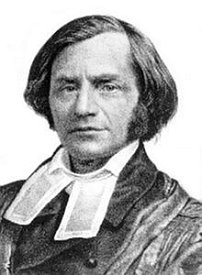 Friedrich Conrad Dietrich Wyneken stands along-side C.F.W. Walther and Wilhelm Sihler as one of the founding fathers of The Lutheran Church — Missouri Synod. He was born to Pastor Heinrich Christoph and Anne Catharine Louise Wyneken in on 13 May 1810 and baptized 22 May in St. Andreas Church, Verden, Kingdom of Hannover, Germany.
Friedrich Conrad Dietrich Wyneken stands along-side C.F.W. Walther and Wilhelm Sihler as one of the founding fathers of The Lutheran Church — Missouri Synod. He was born to Pastor Heinrich Christoph and Anne Catharine Louise Wyneken in on 13 May 1810 and baptized 22 May in St. Andreas Church, Verden, Kingdom of Hannover, Germany.Wyneken came to Baltimore in 1838 and shortly thereafter accepted a call to be the pastor of congregations in Friedheim and Fort Wayne, Indiana. Supported by the mission society of Wilhelm Loehe's, he served as an itinerant missionary in Indiana, Ohio, and Michigan, particularly among Native Americans.
Together with Loehe and Sihler, he founded Concordia Theological Seminary in 1846 in Fort Wayne, Ind. He later served as the second president of the LCMS during a period of significant growth (1850-64). His leadership strongly influenced the confessional character of the LCMS and its commitment to an authentic Lutheran witness.
Technorati Tags: Friedrich Conrad Dietrich Wyneken | Friedrich Wyneken | F. C. D. Wyneken | Wilhelm Loehe | Wilhelm Löhe | Wilhelm Sihler | C.F.W. Walther | Church Year | liturgical calendar | Christian | Lutheran | commemorations | lectionary | missions | Indian missions | Native American missions | historical theology | church history | Lutheran history | American Lutheran history | American history | biography | The Lutheran Church — Missouri Synod | LCMS | Concordia Theological Seminary | Concordia Theological Seminary, Fort Wayne, Indiana
 Athanasius was born in Alexandria in Egypt in AD.295. He served as a church leader in a time of great controversy and ecclesiastical disagreements. While he was still a deacon, around the year 319, a presbyter (pastor) named Arius began a non-Biblical teaching about Jesus Christ. At the Council of Nicaea in 325, Athanasius, despite his relative inexperience in ecclesiastical office, defended Christian orthodoxy against the proponents of the Arian heresy. This belief denied the full divinity of Jesus Christ, claiming that there was a time when the Son was not and that He was thus inferior to the Father according to His "essence." Results of the Orthodox party's eventual victory included the Nicene Creed.
Athanasius was born in Alexandria in Egypt in AD.295. He served as a church leader in a time of great controversy and ecclesiastical disagreements. While he was still a deacon, around the year 319, a presbyter (pastor) named Arius began a non-Biblical teaching about Jesus Christ. At the Council of Nicaea in 325, Athanasius, despite his relative inexperience in ecclesiastical office, defended Christian orthodoxy against the proponents of the Arian heresy. This belief denied the full divinity of Jesus Christ, claiming that there was a time when the Son was not and that He was thus inferior to the Father according to His "essence." Results of the Orthodox party's eventual victory included the Nicene Creed.During his 45-year tenure as bishop of Alexandria, Athanasius wrote numerous works that defended the orthodox teaching. His enemies had him exiled five times; on two occasions he was almost murdered. Looking back, we see that there were times when Athanasius equalled his opponents' misbehavior, going so far as to engage mercenaries to enforce his episcopacy in Alexandria. Yet Athanasius remained steadfast and ended his days restored fully to his church responsibilities. The Athanasian Creed, though not composed by him, is named in his honor because it confesses the doctrinal orthodoxy he championed throughout his life.
Athanasius became known in the West as one of the four Easterns among the Eight Great Doctors of the Undivided Church. See the biography of Saint Ambrose for all eight.
Lection
Psalm 71:1-8 or 112:1-9
1 John 5:1-5
Matthew 10:22-32
Collect
Uphold Your Church, O God of truth, as You upheld Your servant Athanasius, to maintain and proclaim boldly the catholic faith against all opposition, trusting solely in the grace of Your eternal Word, who took upon Himself our humanity that we might share His holiness; who lives and reigns with you and the Holy Spirit, one God, now and forever.
Technorati Tags: Athanasius | Athanasius of Alexandria | Saint Athanasius | St. Athanasius | Doctors of the Church | Nicaea | Council of Nicaea | First Ecumenical Council | Nicene Creed | Niceno-Constantinopolitan Creed | Church Year | liturgical calendar | Christian | Lutheran | commemorations | biography | hagiography | historical theology | Church history
 Wow! Less than a month between updates to the Big Blogroll O' Vark®™©. These probably aren't the only changes; it seems that each update brings one or more responses concerning adding, deleting, or changing a listing.
Wow! Less than a month between updates to the Big Blogroll O' Vark®™©. These probably aren't the only changes; it seems that each update brings one or more responses concerning adding, deleting, or changing a listing.Now if you're not sure what to make of the BBOV or wonder about the benefits of being listed and of listing others' blogs, please read the first three links under Aurous Effluence in the sidebar. Those who'd like the Big Blogroll O' Vark®™© can either email me or copy the list from the Alley's source code (click View | Page Source or Control+U in Firefox or View | Source in Internet Explorer).
• DIMINISHING CRAZINESS
Only one blog leaves the rolls this time. Ericka's Vida Loca!, while still listed with Blogger, is now "open to invited readers only." I don't know if this will change or not. If Erika comes back with the same mix of life and theology, I'll be happy to re-add her to the BBOV.
• NEW FACES
Please join now in welcoming the newest additions to the BBOV. For whatever reason, of these five recent discoveries, three are by LCMS pastors. Of these, Fishpond is actually somewhat of a mulligan. Author Robin Fish had another blog some time ago but has resurfaced with a new title and a fresh look. The other two new preacher blogs are Sinner and Saint and Rev. Tucher.
Now just because I listed the three pastor first means that I have anything against the other two. Indeed, I think that my bright, literate, and theologically astute readers should enjoy the style and substance of A Fort Made of Books, from a Saint Louis Lutheran who also knows his music. Then we have The Blair Church Project, written by a "class action trial lawyer, ministry organizer, urban missionary and confessional Lutheran." Boy, if that combination of words and phrases doesn't shiver the spines of folks all across the political and religious spectrums...!
For these and all others enrolled in the BBOV, links back are certainly appreciated. And don't forget that all of those listed benefit when you use the entire blogroll. Also, if you'd like to graphically point to the Alley and the Big Blogroll O' Vark®™©, you may use the above design from St. Charles Place or one of these blog buttons:
Finally, if you own or know of a Lutheran blog demonstrating a quia confessional subscription and would like me to consider it for inclusion, please leave a comment. And again, for more information about why this stuff benefits confessional Lutheran blogging, morality, and other worthwhile endeavors, please check out the first three links under Aurous Effluence in the sidebar.
Technorati Tags: Aardvark Alley | Big Blogroll O' Vark®™© | BBOV | blogroll | blog roll | Lutheran | confessional Lutheran
 People frequently confuse Philip the Apostle with Philip the Deacon, whose story is included in the Acts of the Apostles. See Acts 6:1-6; 8:5-40; and Acts 21:7-9 for accounts from his life. This Philip's commemoration is on 6 June. Philip the Apostle appears in the Synoptic Gospels and in Acts only as a name on the list of the Twelve, but he appears in several incidents in the Gospel according to John.
People frequently confuse Philip the Apostle with Philip the Deacon, whose story is included in the Acts of the Apostles. See Acts 6:1-6; 8:5-40; and Acts 21:7-9 for accounts from his life. This Philip's commemoration is on 6 June. Philip the Apostle appears in the Synoptic Gospels and in Acts only as a name on the list of the Twelve, but he appears in several incidents in the Gospel according to John.He was one of the first men Jesus called to be a disciple (John 1:43-44), and promptly brought his friend Nathanael to Jesus as well (v 45). When some Greeks (or Greek-speaking Jews) wished to speak with Jesus, they began by approaching Philip, who took Andrew and went to Jesus. This led Jesus to His declaration, "I, when I am lifted up from the earth, will draw all people to myself." (12:20-33). At the Last Supper, he said to Jesus, "Lord, show us the Father, and it is enough for us." Jesus responded, "Whoever has seen me has seen the Father." ( see 14:1-14)"
Before feeding the Five Thousand (John 6:1-15), Jesus turned to Philip and asked Him, "Where are we to buy bread, so that these people may eat?" Philip answered, "Two hundred denarii would not buy enough bread for each of them to get a little."
Some scholars think it might be significant that Jesus asked Philip rather than one of the others. Luke 9:10 says that the Feeding of the Five Thousand took place near Bethsaida, and John 1:44 shows Philip coming from Bethsaida. If they were in Philip's home area, it would seem natural to ask him for directions. (As an aside, we note that Peter and Andrew also came from Bethsaida, but appear to have moved to Capernaum.)
James the son of Alphaeus (sometimes spelled "Alpheus") appears on lists of the Twelve Apostles, usually in the ninth place, but is never mentioned otherwise. He is called James the Less, or James Minor, or James the Younger. (See Matthew 10:3; Mark 3:18; Luke 6:15; Acts 1:13) Thus, we know nothing of him from the New Testament except that he was one of Jesus' original disciples and one of the Apostles. However, because of other Jameses being mentioned in the New Testament, we get the impression that he is everywhere. This isn't because of James the Less, but because he shared his name with several others — after all, it was one of the most common names among the Jews.
Why was James such a popular name in Israel? It was the given name of the original Israel: The English James is a variant of the name Jacob. While we may think of them as unrelated, the distinction grew after Bible times. In Hebrew, the name is Ya'akov. In Greek, it is Iakobos. In Latin, two forms developed, Jacobus and Jacomus. The former gives us the English Jacob and the Spanish Diego and Iago. The latter grew into the English James, the Scottish Hamish, the Spanish Jaime, and so on.
That ends what we hear of Saints Philip and James in the New Testament and we don't get much additional help from extrabiblical tradition. One story says that Philip preached in Phrygia and died in Hierapolis, and that his remains were brought to Rome and buried in the Basilica of the Twelve Apostles, where an ancient inscription indicates that this church was formerly dedicated to Philip and James.
Lection
Psalm 36:5-12
Isaiah 30:18-21
Ephesians 2:19-22
John 14:1-14
Collect
Almighty God, Your Son revealed Himself to Philip and James and gave them the knowledge of everlasting life. Grant us perfectly to know Your Son, Jesus Christ, to be the Way, the Truth, and the Life, and steadfastly to walk in the way that leads to eternal life; through the same Jesus Christ, our Lord, who lives and reigns with You and the Holy Spirit, one God, now and forever.
Technorati Tags: Saint James | St. James | Apostle James | James | James the Less | Alphaeus | Saint Philip | St. Philip | Apostle Philip | Philip | apostle | disciple | twelve apostles | twelve disciples | Jesus | Jesus Christ | Christ | Church Year | liturgical calendar | Christian | Lutheran | commemorations | biography | hagiography | historical theology | Church history

